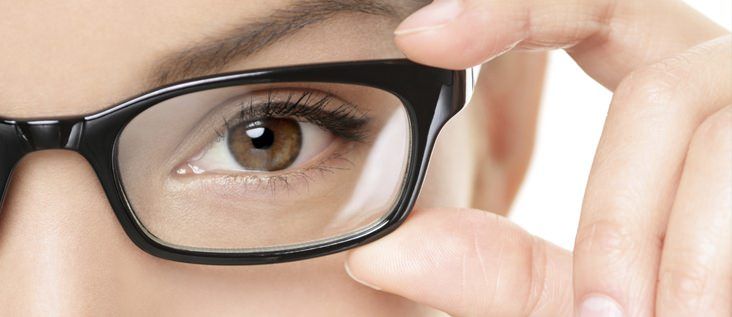Once you have chosen your frame, the next step is to decide what eyeglass lens will best meet your needs. The eyeglass lenses are the most important part of your new eyeglasses! As glass lenses are often no longer an option, plastic lenses are more the norm. 99% of all lenses dispensed in our office are a type of plastic. In our office, plastic lenses are recommended the majority of the time. Lens coatings and treatments are also offered as options on plastic lenses. Lens coatings help protect your eyes and the surface of the lens. We offer many different types of plastic lens coatings and treatments in our office, but really, what makes all these coatings different?
Scratch Guard Eyeglass Lens Coatings
The most basic coating you can get at our office is a plastic lens that has a basic scratch guard coating. Scratch guard lens coatings help prevent surface scratching on the lenses. It helps to minimize scratches when glasses are being handled but is not a scratch-proof coating. Scratches can still appear, depending on how your eyeglass lenses are being cleaned and handled. That’s why it is very important to give your eyeglasses the utmost care and TLC to keep them in their best shape. Although some scratch guard coatings are better than others, no coating will absolutely prevent scratching.
Antireflection Coatings
The eyeglass lens treatments that are most recommended by our doctors, opticians, and dispensers in our office are plastic eyeglass lenses which have a combination scratch guard and anti-reflection treatment applied to the surface of the eyeglass lens. The purpose of an antireflection coating is to help you see with more ease and clarity through the lenses. This increase in clarity is achieved from the coating, by eliminating glare and allowing more light to pass through the lens to the eyes.
Not only are these coatings better for your vision, but they are more cosmetically pleasing as well. This is because the lenses let other people see your eyes more clearly. With most antireflection coatings, an ultraviolet (UV) filter is also applied to the coating to help protect your eyes. These coatings have gotten better over the years, they whether glare, dust, scratches, water, smudges, and UV light. Some antireflection coatings have even been proven to provide 25 times more UV protection than going without eyewear.
Blue Violet Blocking Coatings (Coatings For Digital Device Use)
The majority of the population uses some type of electronic device daily and for many hours at a time. Because of this, eyeglass lens manufacturer like Essilor, have come out with a new lens coating. Crizal Prevencia is a new lens coating that helps combat glare specifically from digital device use. This coating both protects your eyes against harmful UV light as well as the harmful blue-violet light from digital device screens. All while letting essential light pass through the eyeglass lenses, guaranteeing you the best vision and durability of the lenses. Blue light both comes from the sun and artificial light sources. Our environment is full of blue light from computers, smartphones, tablets, etc. In combination with other factors and variables, cumulative blue light exposure can lead to age-related macular degeneration.
Transitions Lenses
Transitions lenses are lenses that when exposed to the sun’s UV rays change colour or automatically darken to become sunglasses. The lenses return to clear once away from UV light. Transitions lenses are a great choice! Especially, if you typically wear your eyeglasses all day long, go outside, or don’t have a set of prescription sunglasses.
Transitions lenses come in colours of grey, brown, and graphite green. You cannot feel UV rays, but they are present all year round. And just like your skin, your eyes need protection. Damage from UV exposure is cumulative. Therefore, it is important to protect your eyes every time you’re out in the sun! Research has shown that UVA and UVB rays may contribute to short-term vision impairment. They also contribute to potentially serious age-related problems and diseases of the eyes, including cataracts. UV light may also contribute to macular degeneration. Macular degeneration is the leading cause of blindness in people over 60 years of age.
So when selecting lens coatings and treatment options, make sure you know exactly what is available to you! This way you can choose the lens coating options which will provide you with the greatest advantage!
If you found this post helpful, you may also find some the following posts interesting as well!
Article written by Karen McAulay, Licensed Optician

